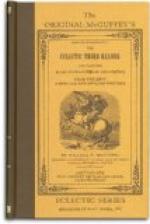[Avoidance of Issue]
No objection was raised to meeting these compilers on their own grounds; but for both parties there was another tribunal than the law. “The public never choose schoolbooks to please compilers.” They stated that to place themselves entirely in the right and remove every cause for cavil or complaint they had expunged everything claimed as original, and substituted other matter, which, both for its fitness and variety would add to the value of the Eclectic Readers. Throughout this preface, after stating the facts regarding the suit, there was a strong claim for the support of Western enterprise.
Although in this appeal the publishers stated that the correspondences between the two series were “few and immaterial,” a careful comparison of the early edition of the Second Reader with the “Revised and Improved Edition” shows that Mr. Smith took out seventeen selections and inserted in their places new matter. To an unprejudiced examiner it appears that the new matter was better than the old. The old marked copy of Worcester’s Second Reader, preserved for all these years, shows ten pieces that were used in both books. It thus appears that the publisher took this opportunity to improve the books as well as to make them unassailable under the copyright law. In three months between the bringing of the suit and the granting of an injunction, Mr. Smith had made his improved edition safe and rendered the injunction practically void.
[The Suit Settled]
The court proceeded in the usual manner and appointed a master to examine the books and make report to ascertain what damage had been inflicted on the owners of the Worcester Readers. But Mr. Smith was an attendant in church and doubtless had heard Dr. Beecher read, “Agree with thine adversary quickly while thou art in the way with him, lest at any time the adversary deliver thee to the judge, and the judge deliver thee to the officer, and thou be cast into prison,” and he had no desire to remain there until he had “paid the uttermost farthing.”
When the master, in the leisurely execution of his duty, made his report nearly two years later, the court found that the defendants had removed from their books the pirated parts and that the suit had been settled by paying the plaintiffs two thousand dollars. There was no further contest about the plan of the two books.
The Worcester Readers had a short and inconspicuous life. When this suit was brought, their publishers were Richardson, Lord and Holbrook of Boston. In 1836 Charles J. Hendee published them, and in 1854 they appeared with the name of Jenks, Hickling & Swan of Boston. These several publishers were probably gobbled up by some imaginary Book Trust sixty years ago.
Dr. McGuffey undoubtedly inserted these selections innocent of any wrong intent and supposed them to be in common use.
[Early Popular Schoolbooks]
As early as 1848 the success of the Eclectic Readers was sufficient to excite imitation and in the First Reader of that year Mr. Smith printed four preliminary pages warning his patrons not to be deceived by “Newman’s Southern Eclectic Readers.”




